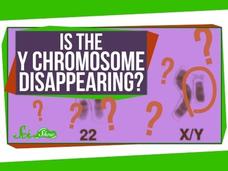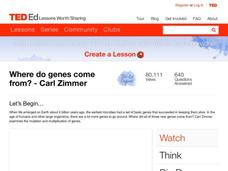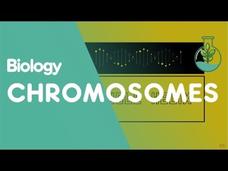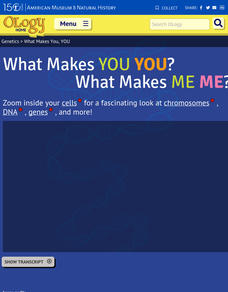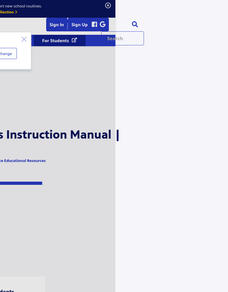Bozeman Science
Linked Genes
Scholars analyze Morgan's fruit fly lab to learn how genes are linked. The instructor shows that the data from a dihybrid cross was not what Morgan expected, and when re-crossed numerous times, the data did not change. Viewers see gene...
SciShow
Is the Y Chromosome Disappearing?
Bye bye, Y! Is the most fundamental difference between men and women slowly going away? Science scholars discover the story behind the ever-shrinking Y chromosome in an interesting human biology video. Topics covered include...
Howard Hughes Medical Institute
The Y Chromosome
Forward and backward, it's all the same! Scientists recently discovered the y chromosome's palindrome nature suggests it's possible to for the y chromosome to recombine with itself! An animation resource gives viewers insight into the...
TED-Ed
Where Do Genes Come From?
No, you didn't get your genes from the local clothing store. Learn where they really come from by watching this video as it explores how the genes found in all plants and animals today have arisen over...
Teacher's Pet
Genes and Chromosomes
Doctors sometimes order a karyotype, a picture of the chromosomes present in a single cell, in order to check for chromosomal abnormalities or rare diseases. The video explains the relationship among genes, chromosomes, and karyotypes....
Bozeman Science
Chromosomal Genetics
The instructor in a biology video defines and shows examples of incomplete dominance, codominance, epistasis, and multiple alleles. Viewers then explore Thomas Hunt Morgan and his crosses showing the discovery of gene linkage via fruit...
Bozeman Science
Chromosomal Inheritance
Scholars see, through a monohybrid cross, how alleles are distributed during meiosis. The video instructor then explores Thomas Hunt Morgan's research on fruit flies, determining that genes are located on chromosomes and showing that...
SciShow
Why Ferns Have More Chromosomes Than You
Potatoes have more chromosomes than humans. A video explores the number of chromosomes various species have and the theories of the differences. It discusses the process of how genes combine as well as the processes of making extra copies.
Bozeman Science
What are Chromosomes?
An informative video begins by showing scholars how chromosomes are like encyclopedias. The instructor then explains and differentiates genome, chromosome, sister chromatids, nucleosomes, DNA, genes, and base pairs.
FuseSchool
What Are Chromosomes?
Two meters worth of DNA fits into a cell that is only two micrometers wide thanks to chromosomes. A video, part of a Fuse School Biology playlist, explains what chromosomes are and how they work. It describes where they are found and how...
Amoeba Sisters
Alleles and Genes
How do organisms end up with such a wide variety of traits? It's in their genes! Kick off your inherited traits lesson using a brief video that covers alleles and genes. The narrator describes heterozygous and homozygous genotypes, how...
Amoeba Sisters
DNA, Chromosomes, Genes, and Traits: An Intro to Heredity
Chromosomes, genes, traits ... how are they all related? A short video introduces the many factors involved in heredity. Junior geneticists explore the transfer of chromosomes from parents to offspring, the proteins created by base pair...
Stated Clearly
What Exactly is a Gene?
What is a gene and how do organisms use them? Find out these answers while learning about how humans have modified genes in plants to best suit their own needs and desires. Before watching the video, you may want to show the video about...
Veritasium
The Sun Sneeze Gene
Do you sneeze when you go from dark to light areas? Twenty-five percent of the population does! It turns out that the characteristic is due to genetic code. Explore why this happens with a video from the Veritasium playlist that...
Bozeman Science
Diploid vs Haploid
If every human on earth looked exactly the same, the world would be a boring place. Thank goodness for genes! Pupils explore the difference between haploid and diploid cells by learning how two parents without red hair can produce a...
American Museum of Natural History
What Makes YOU YOU? What Makes ME ME?
What does DNA have to do with me? Learners watch a short animated video to learn about cells and DNA. Scholars learn that DNA is the building block of chromosomes within the cells of every living thing.
Amoeba Sisters
Mutations: The Potential Power of a Small Change
Are the only mutants you know Ninja Turtles or X-Men? The video explains both gene mutation and chromosome mutation. It includes the subtypes of mutations for each major type, the times when mutations are more likely to happen, and...
Crash Course
Heredity
Ear wax, either wet or dry, is inherited on chromosome 16. The narrator of a video about heredity uses ear wax to introduce the concepts of alleles, dominant and recessive traits, and heterozygous and homozygous genotypes.
PBS
Genome 101: Life's Instruction Manual | UNC-TV Science
Crack open the mysteries inside a genome. Participants view an animated video describing the relationship between DNA, genes, proteins, chromosomes, and an organism's genome. A post-video worksheet allows pupils to apply knowledge by...
Khan Academy
Variation in a Species
If there are no extenuating environmental factors to ensure competition in a species, then variation is achieved by random mutation. This resource may be more useful after viewers are introduced to the concepts of alleles and the...
FuseSchool
What is DNA?
Don't under-strand DNA? Watch an informative Fuse School Genetics video to learn what DNA is and where it is found. It also explains what DNA does, its relationship with genes, the four nucleotides, and their base pairs.
Curated OER
Human Genome
Welcome to the complex biological story that is our life. Great visual imagery zooms in on the dissection of a DNA double helix in our body. What happens with RNA? Where do amino acids come in? This resource explores our inner workings...
Bozeman Science
Advanced Genetics
The strengths and problems associated with Mendelian genetics are explored in a video that first reviews Mendelian genetics and independent assortment. Viewers then explore problems with Mendelian genetics such as linked genes,...
Amoeba Sisters
DNA Structure and Function
Chromosomes come in pairs and in pears. The video covers DNA structure and function including the parts of the nucleotide and the four bases. It provides examples of cloning, gene regulation, and mutation.
Other popular searches
- Dna, Genes & Chromosomes
- Genes and Chromosomes
- Chromosomes and Genes Video
- Dna Genes & Chromosomes
- Dna Chromosomes and Genes
- Genes, Chromosomes and Dna
- Dna Chromosomes Genes



